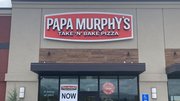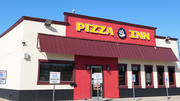News
Cash action settlement
America's largest-ever class-action lawsuit ruling could put cash in the pockets of every pizza operator who accepted Visa and MasterCard from 1992 to 2003.
June 30, 2005
If your pizza operation accepted Visa or MasterCard from 1992 to 2003, both credit-card companies likely owe you money.
No kidding.
As a result of a widely publicized but little recognized — and even less-understood — class-action lawsuit settled in 2003, 5 million U.S. merchants are entitled to divvy up nearly $3.4 billion dollars of Visa's and MasterCard's money. In that same year, a U.S. district court determined both lenders were guilty of unfair trade practices because they demanded merchants accept Visa and MasterCard debit cards along with their credit cards. That both companies required their debit transactions be signature-based rather than PIN-based cost merchants significantly more per transaction, and the court ruled the mandate anticompetitive because it kept merchants from seeking services from lower-cost processors.
Now
|
What's surprising, however, is few merchants know they're entitled to any money. Of 10 organizations and operations called or e-mailed by PizzaMarketplace, none knew anything about the case, the settlement or their ability to claim a share of the spoils. A spokeswoman for the National Restaurant Association said its legal corps was aware of the settlement, but that no one was immediately aware of whether any NRA members had filed claims.
Pizza Hut spokeswoman Patty Sullivan had a similar response. "No one I've talked to so far knows anything about this."
Louis DeAngelo, chief executive of 17-unit DeAngelo's Pizzeria, summed it up similarly for other independent pizza operators.
"No, I'm not aware of that at all," said DeAngelo, whose company is in Baton Rouge, La. "I pride myself on staying up on news like that, but I haven't heard a thing about it."
The fact remains that operators like DeAngelo should have known and even may have received notice, and yet remain unaware of the settlement's potential effect on their businesses. In 2004, the claims administrator in the suit was supposed to notify by mail all merchants who accept Visa and MasterCard that they should submit a claim. But given the size of the claimant pool, the opportunity for missing notification is likely because of: the chance that whoever received the information didn't understand it and discarded it; and the chance that the intended recipient no longer works for that company.
Experts say these are a few among many reasons why only about 15 percent of claimants in class action settlements ever step up to sup at the settlement trough. Additionally, many legal documents are intimidating to the general public, and getting involved, it seems, isn't worth the hassle. Even operators of many large corporations — who stand to benefit most from the Visa-MasterCard settlement — are clueless about the cash that awaits them.
"We're contacting companies in the 'Fortune 1,000,' and only 10 percent of those people are aware of this case," said Paul Ringelstein, channel sales manager for Spectrum Recovery Services in San Francisco. Spectrum specializes in recovering monies for claimants in class-action settlements. "We're finding that either these companies are not being notified, the correct people have moved to other jobs, or there was an acquisition or a bankruptcy and things are being overlooked. The bottom line, though, is the money is still theirs."
Getting your share
According to the Web site of Constantine and Cannon, the lead counsel in the lawsuit, the claims administrator, The Garden City Group, Inc., is supposed to supply to all merchants a claim form, including an estimate of each merchant's share of the settlement funds.
Ringelstein warned, however, that Visa and MasterCard are basing those estimates on transaction data pulled from some 80 "different and disparate" databases, and that neither company has precise data available from 1992 to 1996, a swath of time representing one-third of the total claim period. Those estimates, he added, should be questioned
 |
 |
 |
"For clients that use us, when their estimate comes, we file a dispute that day," he said. In class action suits, he added, claims administrators don't make it easy on claimants to get their cash, and this case is no exception. "If you want to dispute your claim, they'll tell you that you can dispute it 30 days from the date it's postmarked, not the day you receive it. They'll also say that you need factual data. But what restaurateur can compile that much transactional data within about two weeks?"
Constantine and Cannon's Web site said the process to file a claim "has been simplified to make it as easy as possible for small and large merchants," and promised free help is available "so that no merchant will need to hire any outside vendor to assist in filling out the claim form or collecting the settlement money to which that merchant is entitled." (The firm's Web address is InReVisacheck-MastermoneyAntitrustLitigation.com.)
Merchants who don't file any claim will cut short their shares in another way, Ringelstein said; class action settlement pools are rarely drained by claimants, and thanks to some plaintiffs' insistence in this case, any unclaimed funds will not be returned to Visa or MasterCard. That means all initial claimants will get a second helping.
"If you file a claim, you also participate in the backend pool of money that's left over," he said. "So you benefit twice, thanks to Wal-Mart, who is talking about recovering hundreds of millions of dollars in this. They were the largest plaintiff in the suit, and they insisted on the funds not being given back."
How much could a pizza operator who files a claim expect to get back? Ringelstein said it's difficult to guess, but speculated on a range of $200 to $1,000 for every $1 million in credit card sales.
And since so many pizza transactions are done with cash rather than credit, is it worth pursuing? Ron Molinaro thought so.
"Eighty percent of all my sales are done on credit cards," said Molinaro, owner of il Pizzaiolo in Pittsburgh. "We're processing $800,000 a year in credit card sales, so I pay 16 to 18 grand a year in fees. I'd definitely like to get some of that back."
DeAngelo, who, like Molinaro, operates dine-in pizzerias, estimates half of all his sales come from credit cards, "but, honestly, it could be a lot higher than that. ... So it could be a decent amount of money for us."
The fact that a recovery firm, like Spectrum, takes a 30-percent cut of the action doesn't bother Molinaro, "because that's found money anyway," and
— Paul Ringelstein |
"We work on contingency, which means we only get paid when the client gets paid," Ringelstein said. "That's a big difference from when a restaurateur gets his own lawyer to take care of this, because the meter is running the whole time."
Spectrum's offer sounded good to Rick Cassara, when Ringelstein explained it to him during the National Restaurant Association Hotel, Motel & Restaurant Show in Chicago in May. But when he returned home to Cleveland, he decided to discuss the offer with the leadership and legal counsel at the Ohio Restaurant Association.
"When things like this sound really good, I sometimes like to move slowly," said Cassara, owner of John Q's Steakhouse and the current chair of the ORA. "Right now, the Ohio Restaurant Association is investigating the opportunity on behalf of its members. So I'm waiting to determine what they conclude before making any decision on what we would do here at John Q's.
"Whether Spectrum is the right one to do that? We don't know. But we may very well find out that they are."
Ringelstein said such skepticism is common because any claim of free or found money seems too good to be true.
"People do sometimes doubt whether it's for real when we tell them what we can do," he said. "But once they learn the details of the case, they want to know, 'How do I get my money?'"
"When do I get my money?" is another big question, and that answer, Ringelstein said, is beyond everyone. The realistic "window of opportunity" to file claims for a share of the settlement is anywhere from two to five months from now, he said, and the sheer size of the class will only slow the process of distribution.
Distribution in other large class actions sometimes comes years after settlements, "so right now this is anybody's guess," Ringelstein added.
Whether the money comes sooner or later won't dampen DeAngelo's desire to dive into the claims pool.
"Absolutely I want to get involved," he said. "Whoever can help me get some of that money back, give him my number. Please!"
To learn more about filing a claim, visit these Web sites:
* fmi.org/elect_pay_sys/VISA_MC.htm
* inrevisacheckmastermoneyantitrustlitigation.com/
 ChatGPT
ChatGPT Grok
Grok Perplexity
Perplexity Claude
Claude









